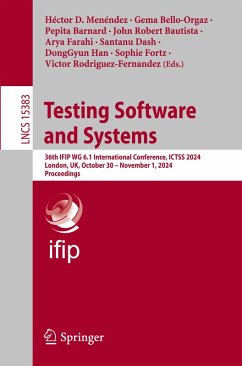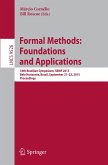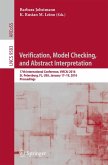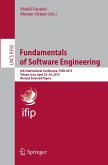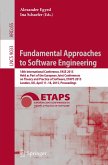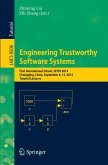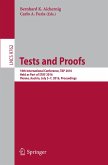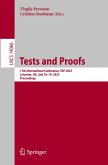Testing Software and Systems
36th IFIP WG 6.1 International Conference, ICTSS 2024, London, UK, October 30 - November 1, 2024, Proceedings
Herausgegeben:Menéndez, Héctor D.; Bello-Orgaz, Gema; Barnard, Pepita; Bautista, John Robert; Farahi, Arya; Dash, Santanu; Han, DongGyun; Fortz, Sophie; Rodriguez-Fernandez, Victor
Testing Software and Systems
36th IFIP WG 6.1 International Conference, ICTSS 2024, London, UK, October 30 - November 1, 2024, Proceedings
Herausgegeben:Menéndez, Héctor D.; Bello-Orgaz, Gema; Barnard, Pepita; Bautista, John Robert; Farahi, Arya; Dash, Santanu; Han, DongGyun; Fortz, Sophie; Rodriguez-Fernandez, Victor
- Broschiertes Buch
- Merkliste
- Auf die Merkliste
- Bewerten Bewerten
- Teilen
- Produkt teilen
- Produkterinnerung
- Produkterinnerung
This book constitutes the refereed proceedings of the 36th IFIP WG 6.1 International Conference on Testing Software and Systems, ICTSS 2024, held in London, UK, during October 30-November 1, 2024. The 17 full papers and 5 short papers included in this book were carefully reviewed and selected from 40 submissions. They were organized in topical sections as follows: Best Paper Award; Industry and Challenge Tracks; Mutation Testing and Code Generation; Advancing Code Vulnerability Detection; Short Papers; Tutorial; Journal First; Health Track; Innovations in Software Testing and AI Compliance;…mehr
Andere Kunden interessierten sich auch für
![Formal Methods: Foundations and Applications Formal Methods: Foundations and Applications]() Formal Methods: Foundations and Applications31,99 €
Formal Methods: Foundations and Applications31,99 €![Verification, Model Checking, and Abstract Interpretation Verification, Model Checking, and Abstract Interpretation]() Verification, Model Checking, and Abstract Interpretation38,99 €
Verification, Model Checking, and Abstract Interpretation38,99 €![Fundamentals of Software Engineering Fundamentals of Software Engineering]() Fundamentals of Software Engineering38,99 €
Fundamentals of Software Engineering38,99 €![Fundamental Approaches to Software Engineering Fundamental Approaches to Software Engineering]() Fundamental Approaches to Software Engineering38,99 €
Fundamental Approaches to Software Engineering38,99 €![Engineering Trustworthy Software Systems Engineering Trustworthy Software Systems]() Engineering Trustworthy Software Systems38,99 €
Engineering Trustworthy Software Systems38,99 €![Tests and Proofs Tests and Proofs]() Tests and Proofs38,99 €
Tests and Proofs38,99 €![Tests and Proofs Tests and Proofs]() Tests and Proofs38,99 €
Tests and Proofs38,99 €-
-
-
This book constitutes the refereed proceedings of the 36th IFIP WG 6.1 International Conference on Testing Software and Systems, ICTSS 2024, held in London, UK, during October 30-November 1, 2024.
The 17 full papers and 5 short papers included in this book were carefully reviewed and selected from 40 submissions. They were organized in topical sections as follows: Best Paper Award; Industry and Challenge Tracks; Mutation Testing and Code Generation; Advancing Code Vulnerability Detection; Short Papers; Tutorial; Journal First; Health Track; Innovations in Software Testing and AI Compliance; Improving Software Testing Reliability and Advancements in Testing Methodologies.
The 17 full papers and 5 short papers included in this book were carefully reviewed and selected from 40 submissions. They were organized in topical sections as follows: Best Paper Award; Industry and Challenge Tracks; Mutation Testing and Code Generation; Advancing Code Vulnerability Detection; Short Papers; Tutorial; Journal First; Health Track; Innovations in Software Testing and AI Compliance; Improving Software Testing Reliability and Advancements in Testing Methodologies.
Produktdetails
- Produktdetails
- Lecture Notes in Computer Science 15383
- Verlag: Springer / Springer Nature Switzerland / Springer, Berlin
- Artikelnr. des Verlages: 978-3-031-80888-3
- Seitenzahl: 364
- Erscheinungstermin: 25. Januar 2025
- Englisch
- Abmessung: 235mm x 155mm x 20mm
- Gewicht: 552g
- ISBN-13: 9783031808883
- ISBN-10: 3031808886
- Artikelnr.: 72093568
- Herstellerkennzeichnung
- Springer-Verlag GmbH
- Tiergartenstr. 17
- 69121 Heidelberg
- ProductSafety@springernature.com
- Lecture Notes in Computer Science 15383
- Verlag: Springer / Springer Nature Switzerland / Springer, Berlin
- Artikelnr. des Verlages: 978-3-031-80888-3
- Seitenzahl: 364
- Erscheinungstermin: 25. Januar 2025
- Englisch
- Abmessung: 235mm x 155mm x 20mm
- Gewicht: 552g
- ISBN-13: 9783031808883
- ISBN-10: 3031808886
- Artikelnr.: 72093568
- Herstellerkennzeichnung
- Springer-Verlag GmbH
- Tiergartenstr. 17
- 69121 Heidelberg
- ProductSafety@springernature.com
.- Best Paper Award.
.- Estimating Combinatorial t-way Coverage based on Matrix Complexity Metrics.
.- Industry and Challenge Tracks.
.- Enhancing RL Safety with Counterfactual LLM Reasoning.
.- GoNoGo: An Efficient LLM-based Multi-Agent System for Streamlining Automotive Software Release Decision-Making.
.- Test Prioritization based on the Coverage of Recently Modified Source Code: An Industrial Case Study.
.- On the variations of ChatGPT's response quality for generating source code across programming languages.
.- Reevaluating the small-scope testing hypothesis of answer set programs.
.- Advancing Code Vulnerability Detection.
.- Enhancing Vulnerability Detection with Domain Knowledge: a Comparison of Different Mechanisms.
.- LLMs Can Check Their Own Results to Mitigate Hallucinations in Traffic Understanding Tasks.
.- Enhanced Graph Neural Networks for Vulnerability Detection in Java via Advanced Subgraph Construction.
.- Short Papers.
.- Mutating Clingo's AST with clingabomino.
.- Towards a Knowledge Graph based approach for vulnerable code weaknesses identification.
.- Tutorial.
.- Automatic Summarization Evaluation: Methods and Practices.
.- Journal First.
.- Summary of ObfSec: Measuring the security of obfuscations from a testing perspective.
.- Health Track.
.- A trusted friend in the middle of the night: End-user perspectives on Artificial Intelligence informed software systems as a decision-making aid for patients.
.- Binary Classification Optimisation with AI-Generated Data.
.- Responsible MLOps Design Methodology for an Auditing System for AI-based Clinical Decision Support Systems.
.- Innovations in Software Testing and AI Compliance.
.- Software System Testing assisted by Large Language Models: An Exploratory Study.
.- Continuous Auditing Based Conformity Assessment for AI Systems: A Proof-of-Concept Evaluation.
.- Improving Software Testing Reliability.
.- Checking Test Suite Efficacy Through Dual-Channel Techniques.
.- Extending a Flakiness Score for System-Level Tests.
.- Advancements in Testing Methodologies.
.- Autonomous Driving System Testing: Traffic Density Does Matter.
.- Annotation-based input modeling for combinatorial testing.
.- Estimating Combinatorial t-way Coverage based on Matrix Complexity Metrics.
.- Industry and Challenge Tracks.
.- Enhancing RL Safety with Counterfactual LLM Reasoning.
.- GoNoGo: An Efficient LLM-based Multi-Agent System for Streamlining Automotive Software Release Decision-Making.
.- Test Prioritization based on the Coverage of Recently Modified Source Code: An Industrial Case Study.
.- On the variations of ChatGPT's response quality for generating source code across programming languages.
.- Reevaluating the small-scope testing hypothesis of answer set programs.
.- Advancing Code Vulnerability Detection.
.- Enhancing Vulnerability Detection with Domain Knowledge: a Comparison of Different Mechanisms.
.- LLMs Can Check Their Own Results to Mitigate Hallucinations in Traffic Understanding Tasks.
.- Enhanced Graph Neural Networks for Vulnerability Detection in Java via Advanced Subgraph Construction.
.- Short Papers.
.- Mutating Clingo's AST with clingabomino.
.- Towards a Knowledge Graph based approach for vulnerable code weaknesses identification.
.- Tutorial.
.- Automatic Summarization Evaluation: Methods and Practices.
.- Journal First.
.- Summary of ObfSec: Measuring the security of obfuscations from a testing perspective.
.- Health Track.
.- A trusted friend in the middle of the night: End-user perspectives on Artificial Intelligence informed software systems as a decision-making aid for patients.
.- Binary Classification Optimisation with AI-Generated Data.
.- Responsible MLOps Design Methodology for an Auditing System for AI-based Clinical Decision Support Systems.
.- Innovations in Software Testing and AI Compliance.
.- Software System Testing assisted by Large Language Models: An Exploratory Study.
.- Continuous Auditing Based Conformity Assessment for AI Systems: A Proof-of-Concept Evaluation.
.- Improving Software Testing Reliability.
.- Checking Test Suite Efficacy Through Dual-Channel Techniques.
.- Extending a Flakiness Score for System-Level Tests.
.- Advancements in Testing Methodologies.
.- Autonomous Driving System Testing: Traffic Density Does Matter.
.- Annotation-based input modeling for combinatorial testing.
.- Best Paper Award.
.- Estimating Combinatorial t-way Coverage based on Matrix Complexity Metrics.
.- Industry and Challenge Tracks.
.- Enhancing RL Safety with Counterfactual LLM Reasoning.
.- GoNoGo: An Efficient LLM-based Multi-Agent System for Streamlining Automotive Software Release Decision-Making.
.- Test Prioritization based on the Coverage of Recently Modified Source Code: An Industrial Case Study.
.- On the variations of ChatGPT's response quality for generating source code across programming languages.
.- Reevaluating the small-scope testing hypothesis of answer set programs.
.- Advancing Code Vulnerability Detection.
.- Enhancing Vulnerability Detection with Domain Knowledge: a Comparison of Different Mechanisms.
.- LLMs Can Check Their Own Results to Mitigate Hallucinations in Traffic Understanding Tasks.
.- Enhanced Graph Neural Networks for Vulnerability Detection in Java via Advanced Subgraph Construction.
.- Short Papers.
.- Mutating Clingo's AST with clingabomino.
.- Towards a Knowledge Graph based approach for vulnerable code weaknesses identification.
.- Tutorial.
.- Automatic Summarization Evaluation: Methods and Practices.
.- Journal First.
.- Summary of ObfSec: Measuring the security of obfuscations from a testing perspective.
.- Health Track.
.- A trusted friend in the middle of the night: End-user perspectives on Artificial Intelligence informed software systems as a decision-making aid for patients.
.- Binary Classification Optimisation with AI-Generated Data.
.- Responsible MLOps Design Methodology for an Auditing System for AI-based Clinical Decision Support Systems.
.- Innovations in Software Testing and AI Compliance.
.- Software System Testing assisted by Large Language Models: An Exploratory Study.
.- Continuous Auditing Based Conformity Assessment for AI Systems: A Proof-of-Concept Evaluation.
.- Improving Software Testing Reliability.
.- Checking Test Suite Efficacy Through Dual-Channel Techniques.
.- Extending a Flakiness Score for System-Level Tests.
.- Advancements in Testing Methodologies.
.- Autonomous Driving System Testing: Traffic Density Does Matter.
.- Annotation-based input modeling for combinatorial testing.
.- Estimating Combinatorial t-way Coverage based on Matrix Complexity Metrics.
.- Industry and Challenge Tracks.
.- Enhancing RL Safety with Counterfactual LLM Reasoning.
.- GoNoGo: An Efficient LLM-based Multi-Agent System for Streamlining Automotive Software Release Decision-Making.
.- Test Prioritization based on the Coverage of Recently Modified Source Code: An Industrial Case Study.
.- On the variations of ChatGPT's response quality for generating source code across programming languages.
.- Reevaluating the small-scope testing hypothesis of answer set programs.
.- Advancing Code Vulnerability Detection.
.- Enhancing Vulnerability Detection with Domain Knowledge: a Comparison of Different Mechanisms.
.- LLMs Can Check Their Own Results to Mitigate Hallucinations in Traffic Understanding Tasks.
.- Enhanced Graph Neural Networks for Vulnerability Detection in Java via Advanced Subgraph Construction.
.- Short Papers.
.- Mutating Clingo's AST with clingabomino.
.- Towards a Knowledge Graph based approach for vulnerable code weaknesses identification.
.- Tutorial.
.- Automatic Summarization Evaluation: Methods and Practices.
.- Journal First.
.- Summary of ObfSec: Measuring the security of obfuscations from a testing perspective.
.- Health Track.
.- A trusted friend in the middle of the night: End-user perspectives on Artificial Intelligence informed software systems as a decision-making aid for patients.
.- Binary Classification Optimisation with AI-Generated Data.
.- Responsible MLOps Design Methodology for an Auditing System for AI-based Clinical Decision Support Systems.
.- Innovations in Software Testing and AI Compliance.
.- Software System Testing assisted by Large Language Models: An Exploratory Study.
.- Continuous Auditing Based Conformity Assessment for AI Systems: A Proof-of-Concept Evaluation.
.- Improving Software Testing Reliability.
.- Checking Test Suite Efficacy Through Dual-Channel Techniques.
.- Extending a Flakiness Score for System-Level Tests.
.- Advancements in Testing Methodologies.
.- Autonomous Driving System Testing: Traffic Density Does Matter.
.- Annotation-based input modeling for combinatorial testing.

